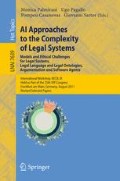Abstract
In public administration, legal knowledge in the form of critical incidents and, for want of a better word, noncompliance storylines is important for monitoring and enforcement, but has no natural place in traditional forms of legal knowledge representation such as normative rules or legal argument schemes. In this paper we present a model-based diagnosis view on the complex social systems in which large public administration organizations operate. The purpose of diagnosis as presented in this paper is to identify problematic agent role instances in a multi-agent system (MAS). We propose the model-based diagnosis problem as an explanation of the driving forces behind requests for change to the IT, business process design, and policy making departments in public administration. This makes model-based diagnosis an important potential legal knowledge acquisition frame for public administration.
Access this chapter
Tax calculation will be finalised at checkout
Purchases are for personal use only
Preview
Unable to display preview. Download preview PDF.
References
Boer, A., van Engers, T.: An agent-based legal knowledge acquisition methodology for agile public administration. In: ICAIL 2011: Proceedings of the 13th International Conference on Artificial Intelligence and Law. ACM, New York (2011)
Reiter, R.: A theory of diagnosis from first principles. Artificial Intelligence 32(1), 57–95 (1987)
Boer, A., van Engers, T.: Knowledge Acquisition from Sources of Law in Public Administration. In: Cimiano, P., Pinto, H.S. (eds.) EKAW 2010. LNCS, vol. 6317, pp. 44–58. Springer, Heidelberg (2010)
Breuker, J.: Components of Problem Solving and Types of Problems. In: Steels, L., Schreiber, G., Van de Velde, W. (eds.) EKAW 1994. LNCS, vol. 867, pp. 118–136. Springer, Heidelberg (1994)
Chandrasekaran, B., Johnson, T.R.: Generic tasks and task structures: History, critique and new directions. In: David, J.M., Krivine, J.P., Simmons, R. (eds.) Second Generation Expert Systems. Springer (1993)
Clancey, W.J.: Heuristic classification. Artificial Intelligence 27, 289–350 (1985)
Steels, L.: Components of expertise. AI. Mag. 11(2), 30–49 (1990)
Kalech, M., Kaminka, G.A.: On the design of coordination diagnosis algorithms for teams of situated agents. Artificial Intelligence 171(8-9), 491–513 (2007)
Roos, N., ten Teije, A., Witteveen, C.: A protocol for multi-agent diagnosis with spatially distributed knowledge. In: Proceedings of the Second International Joint Conference on Autonomous Agents and Multiagent Systems, AAMAS 2003, pp. 655–661. ACM, New York (2003)
Witteveen, C., Roos, N., van der Krogt, R., de Weerdt, M.: Diagnosis of single and multi-agent plans. In: Proceedings of the Fourth International Joint Conference on Autonomous Agents and Multiagent Systems, pp. 805–812. ACM, New York (2005)
Boella, G., Pigozzi, G., van der Torre, L.: Five guidelines for normative multiagent systems. In: Proceeding of the 2009 Conference on Legal Knowledge and Information Systems, pp. 21–30. IOS Press, Amsterdam (2009)
Dung, P.M.: On the acceptability of arguments and its fundamental role in nonmonotonic reasoning, logic programming and n-person games. Artificial Intelligence 77(2), 321–357 (1995)
Bordini, R., Hübner, J., Vieira, R.: Jason and the golden fleece of agent-oriented programming. In: Weiss, G., Bordini, R., Dastani, M., Dix, J., Fallah Seghrouchni, A. (eds.) Multi-Agent Programming. Multiagent Systems, Artificial Societies, and Simulated Organizations, vol. 15, pp. 3–37. Springer US (2005), 10.1007/0-387-26350-0-1
Fonagy, P., Target, M.: Attachment and reflective function: Their role in self-organization. Development and Psychopathology 9(04), 679–700 (1997)
Tinnemeier, N., Dastani, M., Meyer, J.J.: Roles and norms for programming agent organizations. In: Proceedings of The 8th International Conference on Autonomous Agents and Multiagent Systems, AAMAS 2009, vol. 1, pp. 121–128. International Foundation for Autonomous Agents and Multiagent Systems, Richland (2009)
Singh, P.: Examining the society of mind. Computing and Informatics 22, 521–543 (2004)
Gong, Y., Overbeek, S., Janssen, M.: Integrating semantic web and software agents: Exchanging rif and bdi rules. IJSSOE 2(1), 60–76 (2011)
Boer, A., van Engers, T.M.: Implementing compliance controls in public administration. In: Atkinson, K. (ed.) Legal Knowledge and Information Systems - JURIX 2011: The Twenty-Fourth Annual Conference, University of Vienna, Austria. Frontiers in Artificial Intelligence and Applications, December 14-16, vol. 235, pp. 33–42. IOS Press (2011)
Jennings, N.R.: Commitments and conventions: the foundation of coordination in multi-agent systems. Knowledge Engineering Review 8(3), 223–250 (1993)
Author information
Authors and Affiliations
Editor information
Editors and Affiliations
Rights and permissions
Copyright information
© 2012 Springer-Verlag Berlin Heidelberg
About this paper
Cite this paper
Boer, A., van Engers, T. (2012). Application of Model-Based Diagnosis to Multi-Agent Systems Representing Public Administration. In: Palmirani, M., Pagallo, U., Casanovas, P., Sartor, G. (eds) AI Approaches to the Complexity of Legal Systems. Models and Ethical Challenges for Legal Systems, Legal Language and Legal Ontologies, Argumentation and Software Agents. AICOL 2011. Lecture Notes in Computer Science(), vol 7639. Springer, Berlin, Heidelberg. https://doi.org/10.1007/978-3-642-35731-2_16
Download citation
DOI: https://doi.org/10.1007/978-3-642-35731-2_16
Publisher Name: Springer, Berlin, Heidelberg
Print ISBN: 978-3-642-35730-5
Online ISBN: 978-3-642-35731-2
eBook Packages: Computer ScienceComputer Science (R0)

